With reported cases of murder, kidnapping, clashes and imprisonments in different parts of the country, the electoral campaign is becoming more and more violent. Two camps oppose each other: the young Imbonerakure and the Inyankamugayo. The situation escalates as the election day is fast approaching.
The body of Richard Havyarimana, head of the opposition National Congress for Liberty (CNL) in Mbogora locality in Nyabihanga commune in Mwaro province, was discovered on Thursday May 7 in Muyebe locality, in Kibungere area in Nyabihanga commune.
“It was in the Ruvyironza River. His body was in bad shape because he had been mutilated. ”
In his family, it is sorrow. Richard Havyarimana was abducted from his home on the night of May 3 to 4, 2020.
“Men in civilian clothes and others in police uniforms broke into Richard’s house. They beat him up and forcibly brought him into a Toyota Probox car,” say neighbors.
They add that this group of armed men was led by Dieudonné Nsengiyumva, alias Rwembe, leader of the Imbonerakure(youth of the ruling party CNDD-FDD) in Nyabihanga commune, and another Imbonerakure by the name of Boris.
Contacted, Désiré Nsengiyumva did not want to speak to Iwacu. Relatives of Richard Havyarimana deplore the indifference of the Nyabihanga Judicial Police Officer.
“We asked him to start the investigations by issuing summons to the people named in this abduction. They didn’t want to know anything.”
This last Wednesday, the deputy of the prosecutor of Mwaro province went on the spot to make the report.
“He questioned Richard’s wife about what happened and the people she recognized. Nothing more.”
In Cankuzo, three people are still missing. Their families are desperate.
Arcade Butoyi, Alawi Niyonkuru and a certain Amouri were abducted by armed men on April 28 in “Ku Kayaga” bar located in the capital of Cankuzo province.
The day after the kidnapping, the police said they were aware of the case and that investigations were under way.
“Since that day, we have had no information about them. We believe that political motives are hidden behind this kidnapping.”
Arcade Butoyi is the provincial representative of the Union of Education Workers (STEB).
On that day, say his relatives, he had spent the day in Kigamba taking pictures of the CNL election campaign.
Clashes…
Scuffles between the Imbonerakure and the Inyankamugayo continue to erupt in several localities of the country.
In Kirundo Northern Province, there were clashes between the young people of these two parties.
This fight left 18 injured on two sides. A CNDD-FDD activist died after being seriously injured by a spear.
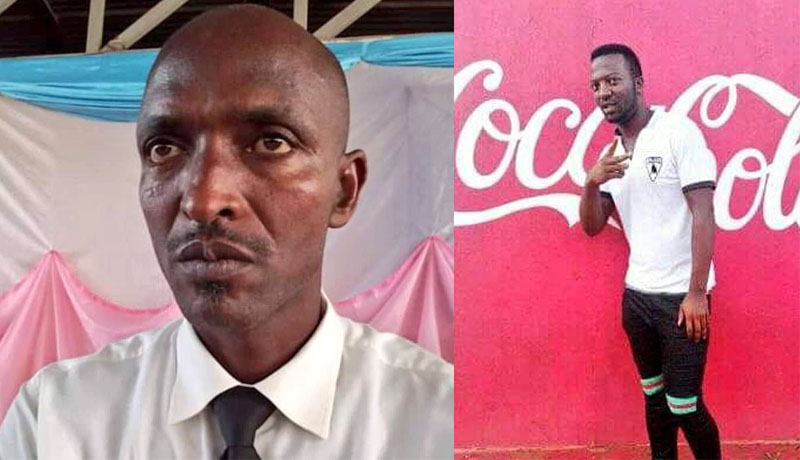
The people kidnapped in Cankuzo are still missing
Several CNL activists were arrested by the police, accompanied by the Imbonerakure.
There were also reports of wounded people on Monday, May 4 in Maramvya locality in Mutimbuzi commune of Bujumbura province where a fight between CNL and CNDD-FDD militants left 7 injured, including 3 supporters of the ruling party.
CNDD-FDD activists wanted to sabotage a CNL meeting on a football field in this locality. Some CNL uniforms were burned. Clashes are also reported in several provinces of the country.
However, it is worth underlining a good example displayed by the Inyankamugayo and the Imbonerakure from Kamesa locality in Musaga zone, in Muha southern commune of Bujumbura city.
This was achieved thanks to the intervention of the administrator of Muha commune, Pastor Daniel Kabura.
The situation almost got tense on the ground known as “Kuba Chinois”. CNL party activists planned to hold a rally there and the Bagumyabanga showed up on the same ground to hold the campaign.
They erected tents next to those of the CNL party. They almost fought, but the administrator managed to calm them down.
Supporters of Agathon Rwasa had to give in and went to erect their tents more than 200 meters away.
The administrator of Muha commune said the ruling party had submitted the request for the occupation of this ground before CNL party.
“It is obvious that CNDD-FDD party should have priority. I salute the attitude displayed by these young people, especially this desire to resolve this problem peacefully. They showed a patriotic spirit.”
When the administration is involved seriously and impartially, things are settled peacefully, says an inhabitant of Kamesa.
Arrests…
The arrest that has widely been talked about in recent days is that of Kathy Kezimana, a CNL candidate for the legislative election and number 2 in Bujumbura province. She is incarcerated in Mpimba prison.
This candidate was arrested on Tuesday, May 5 on the National Road number 7 en route to Bujumbura city.
On her way from Nyabiraba commune, her car was intercepted by the convoy of the police led by the Bujumbura province police commissioner.
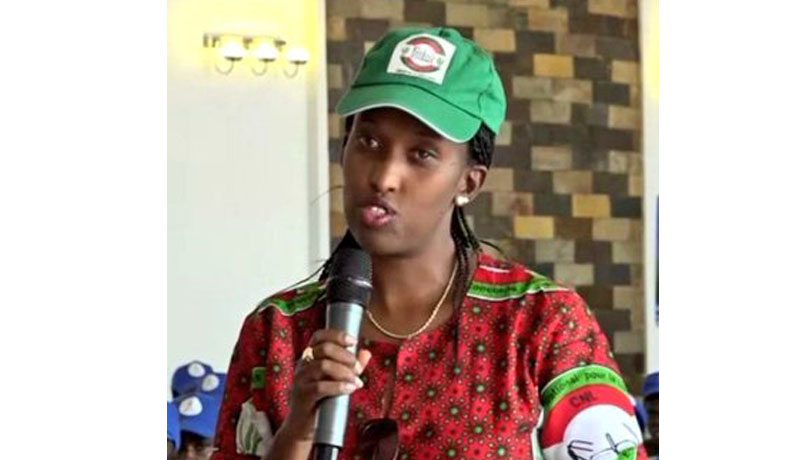
Kathy Kezimana was arrested on the basis of a complaint from the administrator of Mugongomanga commune.
Kathy Kezimana was then taken to the Bujumbura prosecutor’s office where a judge interrogated her for about fifteen minutes before sending her to Mpimba prison. Relatives say she has been receiving threats for some time.
“In the circles of CNDD-FDD activists in Bujumbura province, they swore to attack her if she does not dissociate herself from Agathon Rwasa,” say her relatives.
“We want to prevent her from being elected in the May 20 elections.”
Described as a “politically committed and courageous woman who dreams of change,” she gave a speech at a meeting that probably did not please some people.
“It is deplorable to start this activity by bowing to honor our illustrious members who got killed. We cannot forget them because they were victims of their bravery and wisdom. They died because they refused injustice. We cannot forget our activists who are unjustly imprisoned. However, dry your tears. In 4 months, we will have regained our dignity. We cannot forget all these innocent exiles. They are our parents, our children, our brothers. Tell them to start packing the bags, because they come back in August. We are going to get rid of this regime which oppresses us, “she said.
According to her lawyers, Aline Gahimbare and Modeste Niyonsaba, Kathy Kezimana was arrested on the warrant of the public prosecutor in Bujumbura province after a complaint filed by Diomède Ndabahinyuye, the administrator of Mugongomanga commune.
“Our client is accused of three offenses: hate speech, public insults and threats against the authority”.
According to her lawyers, Kathy Kezimana neither uttered hate speech nor insulted anyone.
“In her speech last week, she was not targeting anyone. She generally spoke as a politician during an election campaign. The complainant had to provide tangible proof that he was targeted. ”
CNL activists in Murengeza locality, Mpanda commune in Bubanza province denounce arrests of Inyankamugayo officials.
That would have taken place on Monday, May 4.
According to sources within the CNL party in Murengeza sector, Apollinaire Ngendabanyikwa, leader of this party in this locality and Fidèle Ntakarutimana, an Inyankamugayo activist from Murengeza went to the office of the communal electoral commission (CECI) in Mpanda commune to plead the cause of one of their members.
“The CECI had unjustly removed the new electoral card from one of our activists,” says a CNL official from Murengeza.
Before they had the time to say the purpose of their trip, Fidèle and Apollinaire were surprised to see the police apprehend them on the spot. They didn’t know why they got arrested.
Following these two arrests, according to the head of the CNL, Jacques Ntakarutimana, leader of the youth Inyankamugayo in the area and Charles Ndayishimiye, a young CNL militant from Murengeza locality were also arrested.
For him, there is no doubt that the four people are victims of their political affiliation.
Another source joined this Tuesday, May 5, told Iwacu that some of them, previously activists of CNDD-FDD in Murengeza, had already been victims of threats and intimidation from the Imbonerakure.
“They attacked them, repeating to them many times that they will pay for the fact that they left the CNDD-FDD party!”, says MM, a relative of one of the four arrested Inyankamugayo.
At the start, a close contact told us the four men were taken to “an illegal place of detention”.
In the evening of last Monday, they were transferred to the cell of Mpanda commune. One of the CNL officials in Murengeza, revealed to us in the same evening that the arrest warrant for the four Inyankamugayo, had been issued by the public prosecutor in Bubanza province.
In the evening of this Wednesday, May 6, the defendants were transferred to the provincial police station in Bubanza.
“They were afraid that Rwasa, who is campaigning today in Mpanda, would release them!”, says MM on Thursday, May 7.
Jean-Claude Nsengiyumva, Bubanza public prosecutor, does not deny the facts imputed to him. “A political party activist is not above the law! He is a citizen like the others. He must answer for the crimes he commits!”
What about the reasons for these arrests?
“People complained that these four men had assaulted them,” says the prosecutor.
Is it political violence? The Bubanza prosecutor replied: “It does not matter to us whether the complainants were attacked for political reasons by the four men of the CNL! It is not our duty to find out their political affiliation!”
Regarding the evidence of these allegations against the four CNL activists in Murengeza, the prosecutor specifies that “the complainants had their clothes torn!”
According to the prosecutor, no doubt, “the torn clothes” of the alleged victims of violence are proof of guilt against the Inyankamugayo.”
The four men have themselves recognized their crime!”
CNL officials deny that, however.
Arrests are also reported in Nyamurenza commune of Ngozi province. CNL officials speak of 11 Inyankamugayo arrested since the start of the electoral campaign for “political motives”.
This is also what the Inyankamugayo of Kabezi commune of Bujumbura province say.
“Our activists are being chased after. On Tuesday, the police accompanied by the Imbonerakure arrested 29 CNL activists.
The targets are those who are on the electoral lists.” Iwacu tried to contact Renilde Ndayishimiye, administrator of Kabezi commune, to no avail.
Is CNL party the target of the power?
For several days, several administrative and police authorities have accused the CNL and its leader Agathon Rwasa of causing trouble during the electoral campaign. The latter speaks of double standards. Other presidential candidates demand a peaceful campaign.
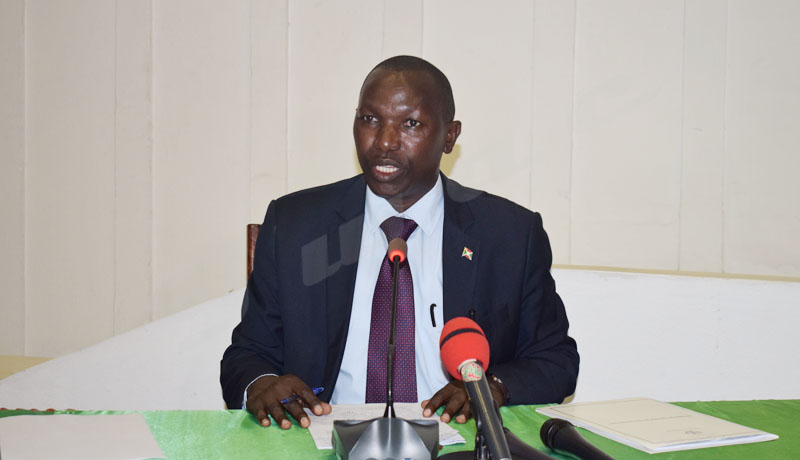
Pascal Barandagiye: “We deplore the behavior of the CNL party even if everything is not well with other political parties.”
On Tuesday, May 5, the police reported, in a week of electoral campaign, two dead people and 18 injured on the side of the CNDD-FDD as well as one case reported missing and 8 wounded on the side of the Inyankamugayo(CNL party activists).
According to the police, 64 suspected criminals were arrested for investigative reasons.
For Pierre Nkurikiye, spokesperson for the Ministry of Public Security, those responsible for all these acts of violence are CNL activists.
Without mincing words, he accuses Agathon Rwasa, the top leader of CNL party and his activists of propagating hate messages inciting the population to violence. They are also accused of electoral fraud.
A day later, the Minister of the Interior, Pascal Barandagiye said “we deplore the behavior of CNL party even if all is not well in the other political parties.”
According to him, this is a final warning for all political parties which are conducting campaigns.
“They must remember the commitments made when the code of conduct was signed during the electoral period on December 23, 2019 in Kayanza.”
As for the Attorney General of the Republic, Sylvestre Nyandwi, he says activists guilty of acts of violence will be punished according to the law.
“Political party leaders are not exempt from prosecution during this period. They must refrain from any act which could incite their militants to resort to violence.”
He asks them to dissociate themselves from their activists who break the law.
Reactions
Pierre Nkurunziza: “We have had enough of war!”
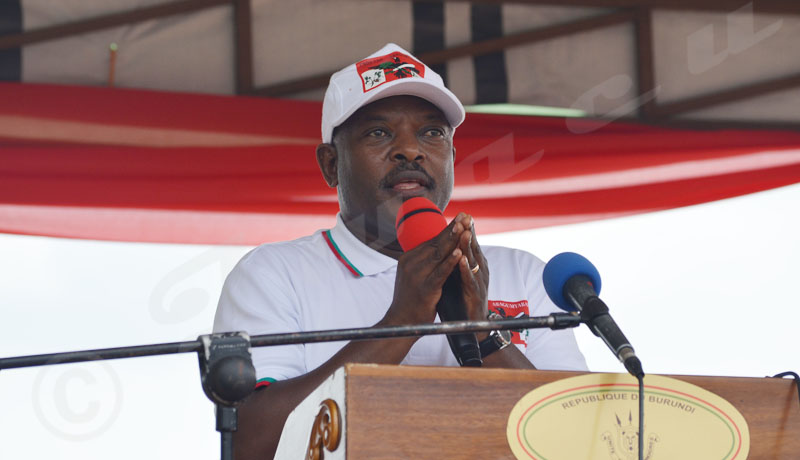 In a campaign for the candidate of CNDD-FDD in Cankuzo province, this Wednesday May 06, 2020, Burundi president Pierre Nkurunziza warned those who want to disturb the elections.
In a campaign for the candidate of CNDD-FDD in Cankuzo province, this Wednesday May 06, 2020, Burundi president Pierre Nkurunziza warned those who want to disturb the elections.
“We will not tolerate anyone who wants to stir up violence. As we have always said, the fire always ends where it was started.”
According to the outgoing president, clear injunctions were given to the police, the army and the intelligence services.
“We are tired of war. We can no longer accept individuals who seek to plunge the country back into war.”
Agathon Rwasa: “CNL party has no intention of disturbing the elections.”
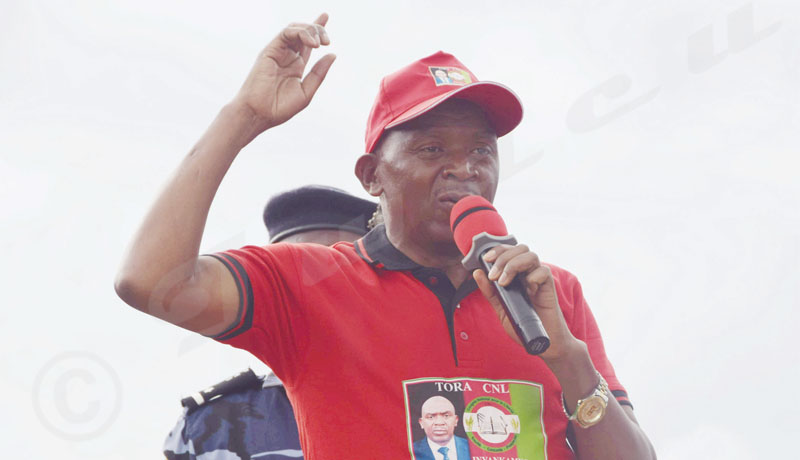 The leader of the Inyankamugayo thinks that the remarks of the spokesperson for the Ministry of Public Security are inappropriate, because CNL party has no intention of disturbing peace in the country.
The leader of the Inyankamugayo thinks that the remarks of the spokesperson for the Ministry of Public Security are inappropriate, because CNL party has no intention of disturbing peace in the country.
“Rather, this is partisan language. He tries to advocate for CNDD–FDD. It is deplorable. However, we saw the police officers who wear the uniforms of CNDD-FDD party.”
Agathon Rwasa believes that the current situation should be brought under control. “I call on the administration and the officials of the CNDD-FDD party to discipline their youth. It is inconceivable that they try to get in our way to attack our militants each time we organize our meetings, and prevent them from going to campaign.
Rwasa reveals that he knows there is a plan to disband the CNL as the MSD party has been. “I have to tell them that it won’t work. We carry out our activities in accordance with the law.”
He wonders why Pierre Nkurikiye says nothing about the abuses committed by the Imbonerakure. “He defends the Imbonerakure”.
Agathon Rwasa says he cannot support someone who breaks the law. “Let them be punished. But, I cannot accept that the innocents be victimized and the criminals be protected. The police spokesperson should change his attitude. ”
For this presidential candidate, the main thing is to respect the electoral code and the Constitution.
“The administration and the police must do their job and not act as militants of political parties.”
Dieudonné Nahimana: “We want a peaceful electoral process”
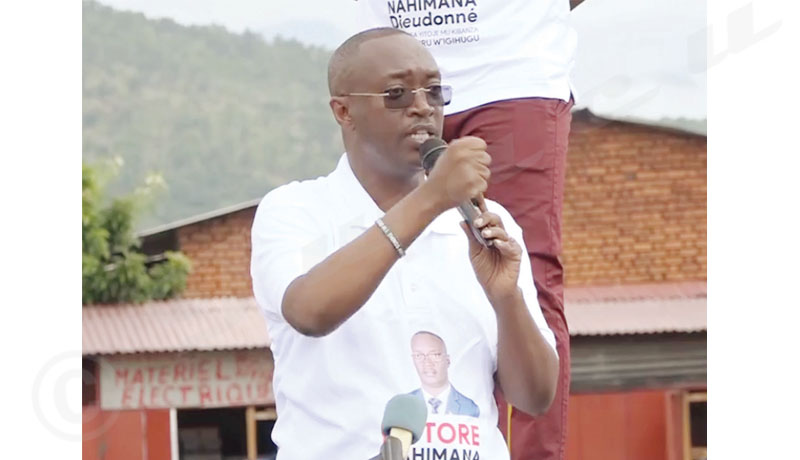 Overall, the independent candidate Dieudonné Nahimana finds that the campaign is going well.
Overall, the independent candidate Dieudonné Nahimana finds that the campaign is going well.
Faced with violence already reported in different corners of the country, Mr. Nahimana says the candidates of the political parties must give a clear message to young people.
“They should be called on to shun violence if there is a misunderstanding. The independent Candidate demands to avoid anything that can bring backwards a process already well advanced.
“My wish is a peaceful process, fair for everyone and that the results are truly the respect of the choices of Burundians.”
Pierre Claver Kazihise: “Respect for the law first”
“I would like to launch an appeal to all partners in the elections, especially those campaigning to comply with the law in general and the electoral code in particular,” said Pierre-Claver Kazihise, president of the Independent National Electoral Commission (CENI).
According to him, there are facts which remain punishable by the law in general during and after the electoral campaign.
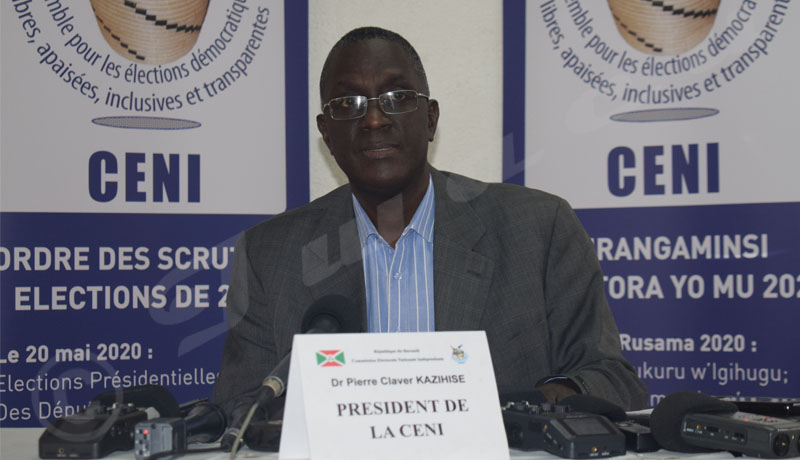
Pierre Claver Kazihise, CENI Chairman
Speaking at a press briefing on Wednesday, Mr Kazihise said that fights and violent crimes were recorded in ten days of the campaign.
In addition to one death, he also cites defamation, insults, violent language inciting hatred, tearing posters of certain candidates, specimens, ballots that the CENI had distributed to help train voters, people participating in the campaign carrying sticks, etc.
For him, these examples show that the instructions that the CENI and other partners had given are not followed.
“The campaign does not mean insulting other candidates. It is not defamation, but rather to present programs to voters,” he said.
Thus, he calls on the candidates to respect the code of conduct and mutual respect.
He emphasizes that the electoral campaign is conducted from 6 a.m. until 6 p.m. in the places already indicated and accepted.
He thanked the security authorities and the justice system for the measures already taken with regard to the monitoring of the electoral campaign.
“We must stay close to the population to avoid the campaign being tarnished by unacceptable and inappropriate behavior.”
Francis Rohero: “Let’s raise our political discussion!”
“I have noticed that there are altercations between the young people of the political parties. I hate to see that in most messages, we talk about others, we abuse, we criticize others,” says Francis Rohero.
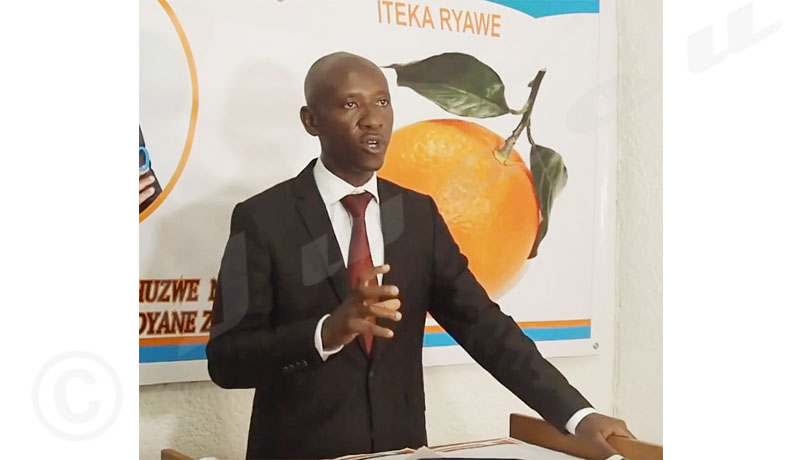 For this independent presidential candidate, the programs had to take precedence over any other thing in the messages.
For this independent presidential candidate, the programs had to take precedence over any other thing in the messages.
“To date, people continue to make harsh criticisms. Some are correct, others false. But that’s what dominates everywhere in our communications.”
We have learned the death in Kirundo of a member of a political party and the imprisonment of party member running for MP.
“All this is due to intolerance because we are unable to talk about programs, because we are convinced that our program cannot appeal to young people in this country. We prefer to highlight the insults, prove that the other is really an animal or that they are incapable. This is what comes forward.”
According to Francis Rohero, people everywhere are poor, unemployed and unable to afford anything.
“This is what brings us together as a people. The young people of CNL, CNDD-FDD, understand that they have the same problems. Let’s discuss what can save us. It is not a flag that will save us”.
According to Francis Rohero, there are not many who take advantage of this situation.
“This is why I say to you: let’s raise our political discussion. We understand each other. Let us accept ourselves as we are. We want the same things: knowing to live in this country with our dignity.”
Elections 2020 / Exclusive interview
Professor Julien Nimubona: “Any manipulation of the results will be catastrophic for the country”
With growing political intolerance, the absence of the electoral register, the “big wigs” of the ruling CNDD-FDD who are no longer at the top of the lists, etc, the political scientist returns to current issues a week before the end of the electoral campaign,.
The second week of the election campaign is soon ending, what is your assessment?
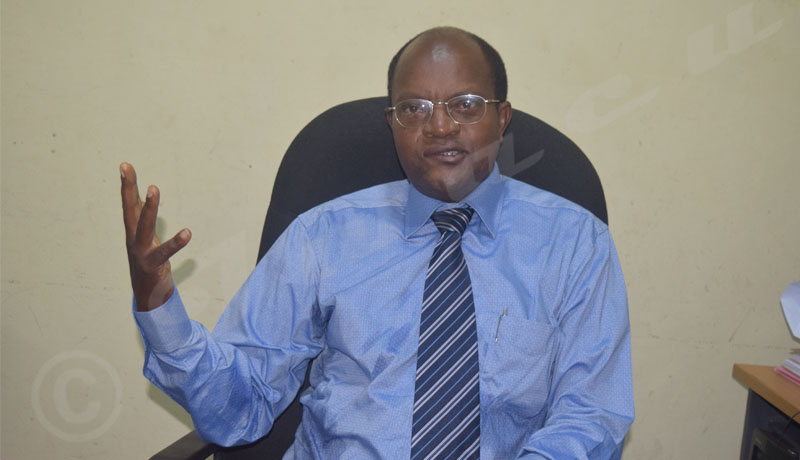 It’s a rather positive assessment. All the major expected themes were addressed, of course some, more than others. I quote, in particular youth unemployment.
It’s a rather positive assessment. All the major expected themes were addressed, of course some, more than others. I quote, in particular youth unemployment.
It is not enough to announce, you have to show the feasibility. The second theme is the socio-economic development.
As the majority of the electorate is the rural population which lives on agriculture and breeding, it is enough to see how much all the candidates competed to speak about the inputs, the development banks. The third theme is infrastructure. Furthermore, there is also the security theme.
What do you think is the cause of the escalation in political intolerance reported here and there?
It is the “CNL phenomenon or Rwasa phenomenon”, which annoys. It must be admitted, this is no longer a story of the political party and its leader.
It is a massive movement, from day to day that is gaining momentum. Considering the number of people who are joining it, this unfortunately annoys the ruling CNDD-FDD.
It is in this logic that the ruling party uses all its means to stop them in their tracks.
So, it would surprise me if it didn’t go this way, because our political actors are used to this kind of violent resolution.
What is the message behind the latest warnings from certain authorities (public prosecutor, police spokesperson)?
I am astonished by the fact that the law begins to be said currently, whereas long before the campaign, these authorities should have alerted, even punished the troublemakers.
Here I’m talking about the blunders committed by young people affiliated to the ruling CNDD-FDD.
It must be said that if justice, the police, the administration had not been too lax towards them, this intolerance would have diminished considerably.
Intolerance is also this deplorable way of the authorities to create factions of political parties on the eve of the elections (case of UPRONA by Mbayahaga).
This is against the law, the electoral code. I wonder “who this political intolerance favors”. This is what I called, “a state that goes on an electoral campaign.”
This is the big problem of our country. The Independent National Electoral Commission (CENI) is not the right body for the management of electoral disputes. It is up to the justice system, the police, to be neutral with regard to these parties competing for the good holding of the elections.
However, it turns out that this is not the case.
Agathon Rwasa declares that his activists shall defend themselves in the event of attacks. What’s your comment on that?
This is a new fact in his speeches. Until then, Mr. Rwasa had always been moderate, weighing his words. Coming to this situation, I think to some extent that he is upset.
He saw that the regulator does not appear neutral. And the examples are many.
Whenever his activists are persecuted, the justice system and the police are not protective.
These institutions remain partisan. With this new rhetoric, the risk is that if nothing is done immediately, Rwasa and the other candidates will adopt the same attitude. The situation will thus be difficult to control.
The CENI retreats into silence. What should be its role?
Its role is to read the electoral code. It must be that neutral body responsible for organizing the elections.
As such, it must challenge the police, the justice so that in case of possible blunders, these bodies help it to put the political leaders back on track.
Unfortunately, it is a task which it finds it difficult to carry out, because cases of the commission being biased are reported on the ground.
Many observers fear a catastrophic management of the results of the elections. Is there a reason to worry?
Regarding the level of engagement of activists, political leaders on both sides, the fears are well founded. This is why state managers must be highly responsible by being neutral, by applying the law, by reporting the facts on the ground as they are.
In short, they must demonstrate what is called “the sincerity of the elections”. That is, to proclaim the results of the elections, as reflected by the expression of the population. Otherwise, any manipulation will be catastrophic for the country.
What’s your observation on those who draw the parallel between the election of 1993 and that of 2020?
The situation is not the same. In 1993, these were shock elections. A clash between the then ruling elite since independence dominated by a minority and a demographic majority who said they were excluded or even abused.
The other difference is the emotional, ideological and ethnic dimension of 1993 that we do not find today. For the upcoming poll scheduled for May 20, there is political opposition and power.
The only proximity is that the current power has managed previous political crises, especially that of 2015. Such a state of affairs creates a cleavage almost similar to that of the previous period of 1993.
The ethnic card was always decisive during the elections in Burundi. Will it be the case?
The ethnic divide is there. It never left Burundi. Besides, if there had not been the Arusha Accord that fixed the representative ethnic quotas in the institutions (included in the Constitutions of 2005 and 2018), I fear that the political parties would not have been obliged to have all ethnicities.
The proof is enough to see when big issues arise within the parties. There are ethnically homogeneous groups which are created and marginalize the other group according to the ethnic majority beside.
And this is linked to the phenomenon referred to as “consciousnesses without structures”.
The great majority of people from Tutsi ethnic group who were members of UPRONA and MSD parties will today tend to seek where to find their way so that their voices can be heard (ex Tatien Sibomana, Dr Yves Sahinguvu in Kira-Burundi coalition).
What’s your comment on the electoral register which is still missing?
It is a scandal. The first duty of the CENI before the start of the election campaign, was to announce the list of people who will vote.
On the other hand, I am astonished by the fact that the political parties or actors started to conduct electoral campaigns without knowing it.
In my humble opinion, it’s a totally irresponsible act. Because, I know very well, if there is a dispute tomorrow, it will be around this document.
Furthermore, knowing the age pyramid of the Burundian population (more than 60% of Burundian youth are 18 years old, editor’s note), it is obvious that this register will be the source of all disputes.
In addition, we do not know how many Burundians outside the country who will not be able to vote following the coronavirus, etc… Has the CENI removed them from the list? Nothing but unknowns!
Does the Burundian population find it politically mature to make a rational choice?
Indicators are perceptible. Recently, the CENI announced the number of people who have withdrawn their voter cards.
In the city of Bujumbura, they were more than 70%. This means that people from the city, from urban centers are distant, critical and mature. This is not the case for the rural population. They have not sufficiently developed the civic culture.
They are in a double culture, a parochial and subjective culture. That is to say, they pledge allegiance to natural persons rather than to institutions or laws. In doing so, they have this propensity to vote for such a candidate because he gave them something.
However, despite this attitude, there is a culture. Little by little “rationality in value” begins to settle. That is to say that the population knows who gives them satisfaction more than another.
At this moment, they run less towards the one who has the power. When the latter is corrupt, they do not hesitate to denounce them.
What’s your prognosis?
Burundians are cautious, conservative. They are afraid of uncertainty. Many people vote for their safety. It will not be surprising to see this security vote win in the countryside. Because they population is convinced that the power will not accept the result of the ballot boxes.
A situation which is different with regard to the people of the city where this vote is not frequent.
Beyond this conservatism, what appeals to me is the Rwasa phenomenon. A very massive surprise remains plausible. Like in 1993 and 2005, people can defy all the risks.
Also, one should add this gradual loss of the electorate of the ruling party going to the former president Domitien Ndayizeye, the candidate of Kira-Burundi coalition, and Léonce Ngendakumana of Sahwanya FRODEBU.
And if it happens that there is a second round, for sure, it will not be in the favor of the CNDD-FDD.
Box
Contrary to what many people think, the political scientist says that it is a common practice within the CNDD-FDD.
“When we look at the legislative lists for 2015, they were renewed at 20%, and those for 2020 at 12.8% “. For him, one should not conclude with an exclusion of personalities.
“If you look closely, most of the current ministers were not on the 2015 lists.” As compensation, Prof. Nimubona said they could eventually be redeployed in the upper echelons of the executive or party administration.
On the other hand, this practice indicates another phenomenon within the party: the confusion of the party and the State, like the party leaders who seem superior to the elected officials.
“These people who are called” Generals “command politically within the government when they have no mandate from the people. It is the same with the party secretaries at the national level, the provincial secretaries, the provincial police commissioners who seem to be more powerful than the MPs or local elected officials. ”
He regrets the marginalization of the Parliament and the Senate within this party. “Since 2010, these two chambers of elected representatives of the people seem to have lost their strength. They look like a space where ordinary activists at the local and national level are rewarded to be.”
According to this political scientist, this can be seen in the fact that their level of education is not taken into account.
Result: these people will vote the bills without a critical analysis what de facto dilutes the function of control of the government actions.
Translated into English by Pierre Emmanuel Ngendakumana



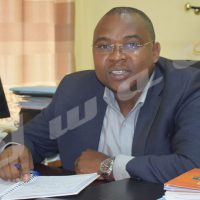
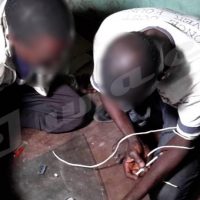











 IWACU Open Data
IWACU Open Data

